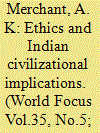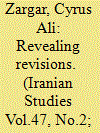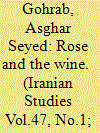|
|
|
Sort Order |
|
|
|
Items / Page
|
|
|
|
|
|
|
| Srl | Item |
| 1 |
ID:
130802


|
|
|
|
|
| Publication |
2014.
|
| Summary/Abstract |
The major civilizations of in human history have been associated with the major religious systems. Some
3,000 years ago Zoroastrianism was the religion of the "glory of ancient Persia," - the Persia that conquered" Babylon, Palestine, Egypt, and the Greek city-states. A few centuries later Judaism was the basis of Hebrew culture, which some philosophers such as Karl Jaspers regards as the greatest in history. And Jewish law has formed the I basis of common law and jurisprudence in countries all over the world. Western culture, until the rise of modem science, was dominated by Christianity. The teachings_ of Islam that burst upon world stage some 1400 years a go preserved and developed the Hellenistic heritage and gave algebra and other sciences. It was probably the greatest civilization the world had seen until the rise of the - Industrial Revolution began to transform Western culture. Today, the tumult of our age of transition is characteristic of the impetuosity and irrational instincts of youth. its follies, its prodigality, its pride, its self- assurance. its rebelliousness, and contempt of discipline.
|
|
|
|
|
|
|
|
|
|
|
|
|
|
|
|
| 2 |
ID:
129003


|
|
|
|
|
| Publication |
2014.
|
| Summary/Abstract |
This article examines four mystical treatises by the Safavid scholar Fayd al-K?sh?n? (d. 1090/1679). Of the four, al-Kalim?t al-Makn?na ("the Hidden Words") serves as the basis for the three other versions, al-La'?li', Qurrat al-'Uy?n, and al-Kalim?t al-Makhz?na, composed at different times for different audiences. Comparison of their structure and content reveals changes that occurred in K?sh?n?'s presentation of the thought of Ibn 'Arab? and Mull? Sadr?. K?sh?n?'s later emphasis on Shi'i hadith sources says much about the context in which he wrote and perhaps more about his later assessment of the place of sufi cosmology, Islamic philosophy, and scripture in scholarly and popular circles.
|
|
|
|
|
|
|
|
|
|
|
|
|
|
|
|
| 3 |
ID:
127783


|
|
|
|
|
| Publication |
2014.
|
| Summary/Abstract |
As everyone knows, alcoholic drinks, including wine, are forbidden by Islam. Readers of Persian poetry often wonder how is it possible that Persian wine literature is one of the richest in the world and whether the poets and authors ever address the illicitness of the wine in their works. This article examines how one author, Zang? Bukh?r?, presents a catalogue of positive and negative qualities of wine in his Gul u mul ("The Rose and the Wine"). Through the genre of debate (mun?zara), he shows how a courtly audience may have tried to justify the drinking of wine. The article examines the formal generic characteristics of such debates, showing how the form of the debate is rather appropriate to let forbidden objects or ideas, in this case the wine, speak for themselves thus defending their position in an Islamic society. entertaining in is richness in metaphors and imagery used by the wine and the rose to voice their superiority to each other, but it also addresses a rather controversial topic in an uncontroversial style.
|
|
|
|
|
|
|
|
|
|
|
|
|
|
|
|
|
|
|
|
|